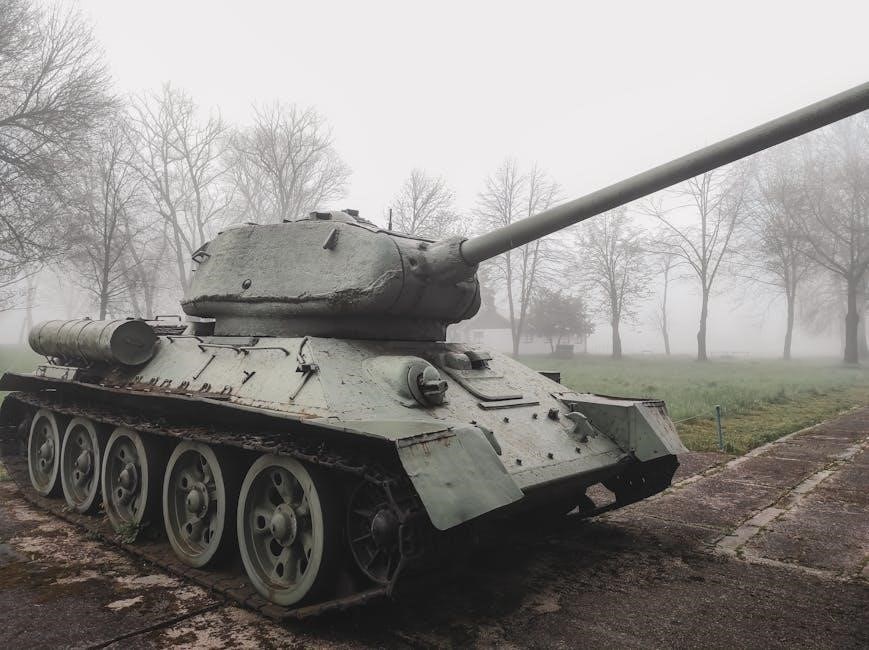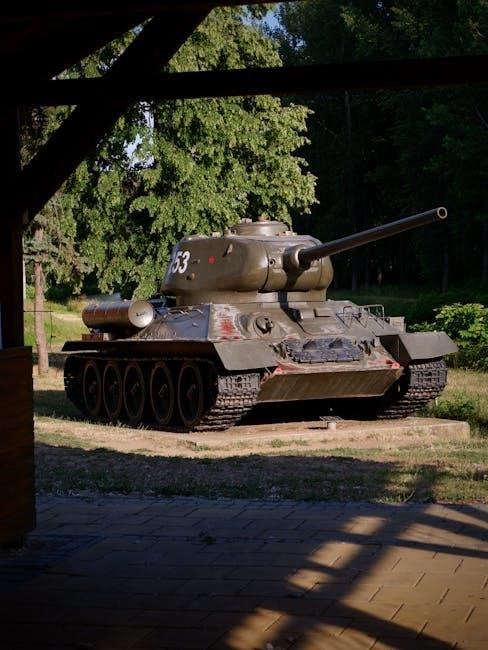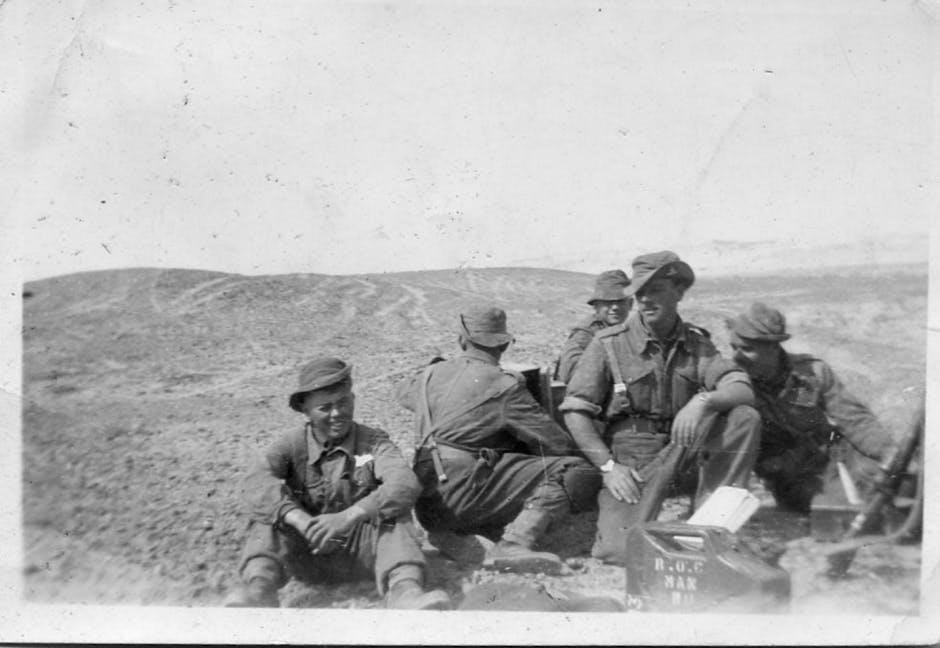The War of the Worlds by H.G. Wells is a groundbreaking science fiction novel published in 1898, exploring a Martian invasion of Earth. Available as a free PDF download, it remains a timeless classic, offering insights into humanity’s resilience and technological anxieties of the late 19th century.
1.1 Overview of the Book
The War of the Worlds by H.G. Wells, published in 1898, is a pioneering science fiction novel that describes a Martian invasion of Earth. The story follows an unnamed narrator as he navigates the chaos of the invasion, offering a gripping account of humanity’s struggle against technologically superior beings. The novel explores themes of survival, imperialism, and the unknown, making it a timeless classic. Available as a free PDF download, it remains a cornerstone of science fiction literature, continuing to captivate readers with its vivid imagery and thought-provoking ideas.
1.2 Publication History
The War of the Worlds was first serialized in Pearson’s Magazine in the UK and Cosmopolitan in the US in 1897. It was later published in book form in 1898 by William Heinemann in the UK and Harper & Brothers in the US. The novel gained immediate popularity for its unique blend of science fiction and social commentary. Today, it is widely available as a free PDF download, ensuring its timeless appeal to readers worldwide.
1.3 Why It’s a Classic
The War of the Worlds is a classic due to its pioneering role in science fiction, exploring alien invasion and humanity’s resilience. Its vivid depiction of Martian technology and societal collapse resonated deeply, blending fear of the unknown with commentary on imperialism. The novel’s timeless themes, paired with its groundbreaking narrative style, have ensured its enduring popularity. Available as a free PDF, it remains accessible to readers, cementing its place as a foundational work in the sci-fi genre.

The Plot Summary
The War of the Worlds narrates Earth’s invasion by Martians, detailing their advanced technology and humanity’s struggle for survival. The story unfolds through the narrator’s journey, capturing societal collapse and resilience amidst chaos. Available as a free PDF, it vividly portrays the clash between human ingenuity and alien dominance, leaving a lasting impact on readers.
2.1 The Martian Invasion
The Martian invasion begins with mysterious cylinders landing in England, releasing towering, tripod-like machines equipped with advanced weaponry, including a devastating heat-ray. The aliens, with their superior technology, swiftly overwhelm human defenses, causing widespread panic and destruction. As society collapses, the narrator witnesses firsthand the Martians’ relentless march across the countryside. The invasion showcases humanity’s vulnerability against an extraterrestrial force, highlighting themes of survival and resilience. The PDF version captures the eerie details of this iconic conflict, making it a gripping read for modern audiences.
2.2 The Narrator’s Journey
The narrator’s journey in The War of the Worlds is a harrowing tale of survival and human resilience; As the Martian invasion unfolds, the narrator travels through the chaotic suburbs of London, witnessing the destruction firsthand. His quest to reunite with his wife amidst the turmoil drives the story, blending personal struggle with the larger cataclysm. The PDF version vividly captures his experiences, from the initial encounters with the Martians to the ultimate realization of humanity’s fragility in the face of superior alien technology.
2.3 Key Themes in the Story
The War of the Worlds explores themes of imperialism, survival, and the fear of the unknown. The novel critiques colonialism by reversing it, with Martians invading Earth. The struggle for survival highlights humanity’s resilience against overwhelming odds. The fear of the unknown is central, as the Martians’ advanced technology and mysterious intentions create widespread panic. These themes, captured vividly in the PDF version, resonate deeply, making the novel a timeless reflection on human vulnerability and societal anxieties. Its relevance endures, offering insights into global fears and technological advancement.

H.G. Wells and His Vision
H.G. Wells was a visionary author who pioneered science fiction. His novel, The War of the Worlds, explores futuristic themes and societal anxieties, now available as a free PDF.
3.1 Biography of H.G. Wells
Herbert George Wells, born on September 21, 1866, in Bromley, England, was a renowned author and a pioneer of science fiction. His early life was marked by financial struggles, but his intellectual curiosity and scholarship opportunities shaped his career. Wells worked as a teacher and journalist before gaining fame with novels like The Time Machine and The War of the Worlds. His works often explored futuristic themes, societal change, and human evolution. Wells was also a passionate advocate for socialism and women’s rights, leaving a lasting legacy in literature and beyond.
3.2 His Contributions to Science Fiction
H.G. Wells is often regarded as the “father of science fiction” for his pioneering works that explored futuristic themes and societal implications. Novels like The Time Machine and The War of the Worlds introduced concepts of time travel and interplanetary conflict, setting the foundation for the genre. Wells’ ability to blend scientific speculation with compelling narratives influenced countless authors and adaptations, cementing his legacy as a visionary in science fiction literature and beyond.
3.3 Inspirations Behind the Novel
H.G. Wells drew inspiration from various sources, including the fear of imperialism, technological advancements, and societal anxieties of the late 19th century. The Tasmanian genocide and European colonialism influenced his depiction of the Martian invasion. Wells’ fascination with astronomy and the possibility of extraterrestrial life also played a role. His vision of a technologically superior force overwhelming humanity resonated deeply, reflecting the era’s fears and curiosity about the unknown. These elements combined to create a gripping narrative that remains relevant today.

The “War of the Worlds” in PDF Format
The PDF version of The War of the Worlds offers a convenient and accessible way to read the classic novel. Available for free download, it ensures easy access across devices, preserving the original narrative’s timeless appeal and making it a preferred choice for modern readers seeking a digital experience.
4.1 Availability of the PDF Version
The PDF version of The War of the Worlds is widely available for free download from various online platforms, including Planet eBook, LitRes, and Project Gutenberg. Readers can access the novel without registration, making it easily accessible to anyone with an internet connection. The digital format ensures convenience, allowing users to read the classic tale on multiple devices such as tablets, smartphones, and e-readers. This accessibility has helped preserve the novel’s timeless appeal, ensuring its reach to modern audiences worldwide.
4.2 Downloading the PDF for Free
Downloading the PDF of The War of the Worlds is a straightforward process, with numerous websites offering free access. Platforms like Planet eBook, LitRes, and Project Gutenberg provide direct links for downloading the novel in PDF format without requiring registration. This ensures that readers can easily obtain and enjoy the book at no cost. The free PDF version is ideal for those seeking a convenient way to read the classic tale on various devices, making it accessible to a global audience.
4.3 Benefits of the Digital Edition
The digital edition of The War of the Worlds offers unparalleled convenience and accessibility. Available in formats like PDF, EPUB, and Kindle, it ensures compatibility across devices, allowing readers to enjoy the classic novel on e-readers, tablets, or smartphones. The digital version is easily searchable, with adjustable font sizes for readability. Additionally, it eliminates the need for physical storage, making it environmentally friendly. These features enhance the reading experience, providing modern comfort while preserving the timeless story.

Historical Context of the Novel
The War of the Worlds, published in 1898, reflects late 19th-century anxieties about imperialism, technological advancements, and societal fears of invasion. Its historical context mirrors the era’s fascination with space exploration and humanity’s vulnerability.
5.1 Late 19th-Century Setting
The War of the Worlds is set in the late 19th century, a period marked by rapid industrialization and societal transformation. The novel’s backdrop, focusing on London and its suburbs, reflects the era’s technological advancements and growing fears of invasion. Wells masterfully captures the anxieties of imperialism, where European dominance was challenged by the idea of an alien force. The setting also highlights the contrast between humanity’s progress and its vulnerability, emphasizing themes of survival and resilience in the face of overwhelming odds.
5.2 Societal Fears and Anxieties
The War of the Worlds taps into late 19th-century societal fears, particularly the anxiety over invasion and the unknown. The novel reflects the era’s concerns about imperialism, technological advancements, and the potential for global catastrophe. Wells’ depiction of a Martian invasion amplified fears of external threats, mirroring the public’s unease about colonialism and the rise of industrialization. These themes resonated deeply with readers, making the novel a timeless exploration of human vulnerability and collective anxiety, now accessible in PDF format for modern readers.
5.3 Technological Advancements Depicted
The War of the Worlds vividly portrays technological advancements through the Martians’ sophisticated machinery, such as towering tripod walkers and heat-rays. These devices symbolize the fear of overwhelming technological superiority. Conversely, humanity’s reliance on familiar technologies like artillery and naval ships highlights the contrasts between 19th-century innovations and alien ingenuity. Wells’ depiction of these advancements serves as a commentary on the rapid industrialization of his era, blending science fiction with societal anxieties, now accessible for analysis in its PDF format.

Major Themes and Symbolism
The War of the Worlds explores themes of imperialism, survival, and fear of the unknown. The Martians symbolize overwhelming technological superiority, while humanity’s struggle reflects resilience and adaptation, as detailed in the PDF version of the novel.
6.1 Imperialism and Colonialism
The War of the Worlds critiques imperialism through the Martian invasion, mirroring European colonialism. The Martians’ exploitation of Earth echoes human treatment of colonized peoples. Wells highlights the irony of humans, who once oppressed others, now facing similar domination. The novel underscores the moral complexities of imperialism, using the Martians’ technological superiority to reflect human arrogance. This theme is central to the PDF version, offering a timeless commentary on power dynamics and colonialism’s consequences.
6.2 Survival and Human Resilience
The War of the Worlds emphasizes survival and resilience as humanity faces Martian domination. The narrator’s journey highlights individual and collective efforts to endure, showcasing adaptability amidst chaos. Wells portrays civilians and authorities alike struggling to survive, reflecting the strength of human spirit. The PDF version underscores these themes, illustrating how resilience emerges even in the face of overwhelming odds, making it a powerful exploration of survival instincts and societal cohesion during crises.
6.3 Fear of the Unknown
The War of the Worlds masterfully explores the fear of the unknown, as humanity confronts alien beings with incomprehensible technology and motives. Wells uses the Martians to symbolize the terror of encountering forces beyond human control, evoking primal anxieties about the universe’s unpredictability. The novel’s depiction of societal collapse and chaos underscores the psychological impact of facing an enigmatic enemy. Available in PDF, the book remains a chilling reminder of how fear of the unknown can unravel human civilization, resonating with readers today.

Adaptations and Interpretations
The War of the Worlds has inspired numerous adaptations, including the infamous 1938 radio broadcast by Orson Welles, films like Steven Spielberg’s 2005 version, and modern reinterpretations, ensuring its enduring relevance in popular culture.
7.1 The 1938 Radio Broadcast
The War of the Worlds gained notoriety through Orson Welles’ 1938 radio adaptation. Broadcast on October 30, it presented the story as a series of news bulletins, causing widespread panic. Many listeners believed a real alien invasion was underway. Welles’ innovative format blurred fiction and reality, sparking public outcry and media scrutiny. This event remains a landmark in broadcast history, demonstrating the power of radio storytelling and its ability to shape public perception. It solidified the novel’s place in popular culture.
7.2 Film Versions and Their Impact
The War of the Worlds has inspired numerous film adaptations, with Steven Spielberg’s 2005 version starring Tom Cruise being the most notable. This adaptation emphasized human survival and emotional drama, resonating with modern audiences. Earlier versions, such as the 1953 film, captured Cold War anxieties, while newer interpretations blend action with the original’s themes. These films have expanded the novel’s reach, making it a cultural icon. The 2005 version is available in HD PDF formats for analysis, showcasing its enduring relevance in cinema.
7.3 Modern Adaptations and Relevance
Modern adaptations of The War of the Worlds continue to captivate audiences, blending the original narrative with contemporary themes. Recent TV series and stage productions have reimagined the story, emphasizing human resilience and technological fears. These adaptations highlight the novel’s enduring relevance, addressing modern anxieties like pandemics and global crises. Available in PDF formats, scripts and analyses of these works offer fresh insights, ensuring the story remains a vital part of popular culture and academic study.

The Cultural Impact
The War of the Worlds has become a cultural icon, shaping science fiction and inspiring countless adaptations; Its themes of survival and technology resonate globally, influencing media and society.
8.1 Influence on Popular Culture
The War of the Worlds has profoundly shaped popular culture, inspiring countless adaptations, including the infamous 1938 radio broadcast by Orson Welles, which caused widespread panic. Its themes of alien invasion and survival have influenced films, TV series, and even video games. The novel’s availability in PDF and other digital formats has further cemented its reach, ensuring its timeless story continues to captivate audiences. Its legacy is evident in modern media, reflecting enduring fears and fascination with the unknown.
8.2 Legacy in Science Fiction
The War of the Worlds is a cornerstone of science fiction, establishing the alien invasion genre and inspiring countless authors. Wells’ exploration of advanced technology, societal collapse, and humanity’s resilience set a benchmark for futuristic storytelling. The novel’s availability in PDF and other formats ensures its ideas remain accessible and influential, shaping modern sci-fi themes like extraterrestrial encounters and existential crises. Its legacy endures as a foundational work that continues to spark imagination and innovation in the genre.
8.3 Public Reception Over the Years
The War of the Worlds has captivated readers since its release, with its gripping narrative of a Martian invasion. The novel’s impact was amplified by the 1938 radio broadcast, causing widespread panic. Over the years, its popularity has endured, with the PDF version ensuring accessibility to modern readers. The story’s timeless themes resonate with audiences, making it a beloved classic in science fiction. Its influence is evident in film adaptations, further cementing its place in popular culture and maintaining its relevance for new generations.

Availability and Downloads
The War of the Worlds PDF is freely available for download from platforms like Project Gutenberg, LitRes, and many others, offering multiple eBook formats for easy reading on any device.
9.1 Free PDF and eBook Sources
Download The War of the Worlds PDF for free from trusted sources like Project Gutenberg, LitRes, and Standard Ebooks. These platforms offer high-quality, downloadable versions in PDF, EPUB, and Kindle formats without requiring registration or payment. Ensure a seamless reading experience by choosing the format that suits your device, whether it’s a smartphone, tablet, or e-reader.
9.2 Platforms for Downloading
Popular platforms like Project Gutenberg, ManyBooks, and Google Books offer free downloads of The War of the Worlds in PDF and other formats. These sites provide easy access to the novel, ensuring a seamless reading experience. Additionally, platforms like Amazon and Barnes & Noble offer free eBook downloads, making it convenient for readers to enjoy this classic tale of alien invasion and human resilience.
9.3 Formats Available (EPUB, Kindle, etc.)
The War of the Worlds is available in multiple digital formats, including PDF, EPUB, and Kindle. These formats ensure compatibility with various devices like e-readers, tablets, and smartphones. Readers can also find versions in FB2 and MOBI for added flexibility. Platforms like Project Gutenberg and ManyBooks offer these downloads for free, making the novel accessible to a wide audience. The digital editions retain the original text’s integrity while providing adjustable fonts and easy navigation for a modern reading experience.
The War of the Worlds remains a timeless classic, offering insights into humanity’s resilience and the fear of the unknown. Its availability in PDF and other formats ensures it continues to captivate readers, making it a must-read for fans of science fiction and classic literature.
10.1 The Timeless Appeal of the Novel
The War of the Worlds endures as a timeless classic due to its gripping narrative, exploration of human survival, and universal themes like imperialism and fear of the unknown. Its vivid depiction of a Martian invasion captivates readers with a blend of science fiction and societal commentary. The novel’s accessibility in PDF format ensures its relevance, allowing modern audiences to experience Wells’ visionary storytelling. Its enduring appeal lies in its ability to evoke both terror and hope, resonating across generations.
10.2 Its Relevance in the Modern Age
The War of the Worlds remains strikingly relevant today, as its themes of technological anxiety, societal collapse, and human resilience continue to resonate. The novel’s exploration of advanced alien technology mirrors modern fears of AI and climate crises. Its depiction of mass panic and survival instincts aligns with contemporary concerns about pandemics and global disasters. Available as a free PDF, the novel’s accessibility ensures its enduring impact, offering timeless lessons on humanity’s vulnerabilities and strengths in the face of the unknown.
10.3 Encouragement to Read the PDF
The War of the Worlds PDF offers a convenient and accessible way to experience this classic tale of survival and resilience. Available for free across various platforms, the digital format ensures that Wells’ timeless story reaches a modern audience. Reading the PDF allows you to delve into the novel’s rich themes and immersive narrative at your own pace. Download it today and discover why this iconic story continues to captivate readers worldwide with its enduring relevance and gripping depiction of humanity’s struggle against the unknown.

Further Reading and Resources
Explore additional resources like free PDF downloads, scholarly articles, and multimedia adaptations of The War of the Worlds on platforms like Project Gutenberg and LitRes for deeper insights.
11.1 Related Works by H.G. Wells
H.G. Wells’ notable works include The Time Machine, The Invisible Man, and The Island of Doctor Moreau. These novels, like The War of the Worlds, explore science fiction and societal themes. Ann Veronica and The Outline of History also showcase his versatility. Many of these works are available as free PDF downloads, alongside EPUB and Kindle formats, from platforms like Project Gutenberg and LitRes, allowing readers to delve deeper into Wells’ visionary ideas and literary legacy.
11.2 Scholarly Articles and Analysis
Scholarly articles and analyses of The War of the Worlds explore its themes, historical context, and cultural impact. Platforms like LitRes and JSTOR offer academic insights into Wells’ vision and the novel’s influence on science fiction. The 1938 radio broadcast’s panic highlights its enduring relevance. Essays examine the Martian invasion as a metaphor for colonialism and technological fear, while others delve into the novel’s sociopolitical commentary, making it a rich subject for scholarly exploration and discourse.
11.3 Multimedia Resources
Multimedia resources for The War of the Worlds include the iconic 1938 radio broadcast by Orson Welles, which caused widespread panic. Jeff Wayne’s musical adaptation offers a unique auditory experience. PDF versions with illustrations and annotations are available on platforms like Project Gutenberg and Standard Ebooks. Additionally, multimedia enhancements such as audiobooks, Russian translations with parallel English texts, and interactive reading tools enrich the storytelling experience, making the novel accessible and engaging for modern audiences while preserving its classic appeal.





